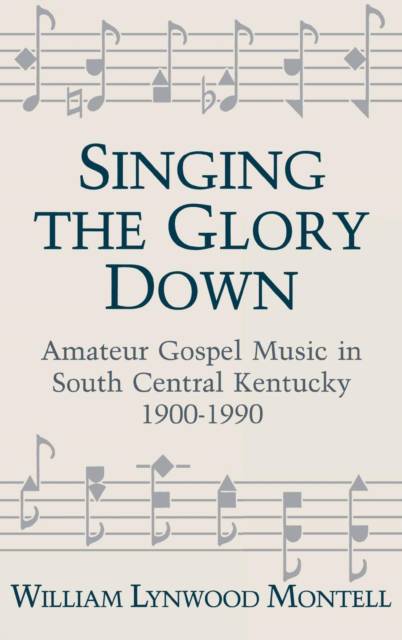
- Afhalen na 1 uur in een winkel met voorraad
- Gratis thuislevering in België vanaf € 30
- Ruim aanbod met 7 miljoen producten
- Afhalen na 1 uur in een winkel met voorraad
- Gratis thuislevering in België vanaf € 30
- Ruim aanbod met 7 miljoen producten
Singing the Glory Down
Amateur Gospel Music in South Central Kentucky, 1900-1990
William Lynwood MontellOmschrijving
In Singing the Glory Down, William Lynwood Montell contributes to a fuller understanding of twentieth-century American culture by examining the complex relationships between gospel music and the culture of the nineteen-county study area in which this music has flourished for a hundred years. He has recorded the memories and feelings of those who were young while the movement gathered steam and who remember it at its high point, and stories about those who have passed over that river about which they loved to sing.
In the early 1900s, a singing school or gospel convention was a major social event that enticed people to walk for miles to learn to sing or to hear someone who already had. The shape-note teachers of those days conducted days or even weeks of nightly practice, which culminated in a performance that confirmed the teacher's skill. Quartet music originated in these settings.
Today, some area quartets still sound much like those early groups; others teach themselves to sing by imitating their favorite professional gospel ensembles.They travel every weekend in buses emblazoned with the names of their groups, with tapes and albums to sell. Through all the changes, the four-part southern harmony of Kentucky gospel music has remained the same.
In the words of these performers, through letters, diaries, and interviews, Montell details the attitudes and joys of those involved most deeply in the gospel music scene. He also brings the reader into their personal relationships, their professional jealousies, and their struggles to keep alive the music they love.
Specificaties
Betrokkenen
- Auteur(s):
- Uitgeverij:
Inhoud
- Aantal bladzijden:
- 264
- Taal:
- Engels
Eigenschappen
- Productcode (EAN):
- 9780813117577
- Verschijningsdatum:
- 12/09/1991
- Uitvoering:
- Hardcover
- Formaat:
- Genaaid
- Afmetingen:
- 163 mm x 238 mm
- Gewicht:
- 607 g

Alleen bij Standaard Boekhandel
Beoordelingen
We publiceren alleen reviews die voldoen aan de voorwaarden voor reviews. Bekijk onze voorwaarden voor reviews.











